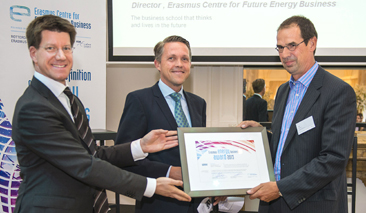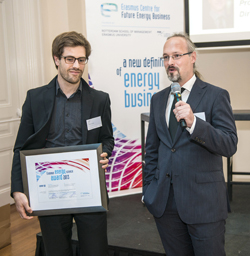Erasmus Energy Awards for Science and Business
Introducing the Erasmus Energy Science and Business Awards, Jan-Christiaan Koenders, President of BMW Group Nederland gave an example of the use of science in business success. BMW engineers were asked to address the use of energy inside the car, and reviewed all the peripheral components using power from the engine, changing the way they were managed. For example, said Koenders, they installed a system that operates the oil pump only when it is necessary to maintain oil pressure. These small steps not only reduced the car’s CO2 emissions, but freed up the engine making it faster.
The Award certificates were presented by Dr Laurens Rook, Assistant Professor at the Technology, Policy and Management Faculty of Delft University of Technology.
Winner of the Erasmus Energy Business Award 2013 was NomadPower of Woerden in the Netherlands. The company received a certificate and the chance to tell the audience about its innovative product. Jos Schreurs of NomadPower told the audience that conventional diesel-powered cooling units create noise and emissions while maintaining the temperature of the goods in the truck’s load during obligatory nine or 11 hour breaks. This can be a particular nuisance at truck stops. NomadPower hook-ups for truck refrigeration units reduce noise and emissions locally, and are cheaper to run than diesel units, ‘saving the environment at no cost!’ he added. The idea came from marinas and harbours where boats can use electrical hook-ups. “But we discovered there were almost no power connection points at parking places for trucks,” he said.
 The company now installs its power points at truck stops along Europe’s main road transport routes. The system is simple to use. The truck driver logs into to a power point using a mobile phone. The system records the user, the location of the power point and the number of Kilo Watt hours used. The information is transmitted to Nomad’s central office, where an invoice is prepared. Trucks need very little adaptation to be able to use the NomadPower system, added Schreurs.
The company now installs its power points at truck stops along Europe’s main road transport routes. The system is simple to use. The truck driver logs into to a power point using a mobile phone. The system records the user, the location of the power point and the number of Kilo Watt hours used. The information is transmitted to Nomad’s central office, where an invoice is prepared. Trucks need very little adaptation to be able to use the NomadPower system, added Schreurs.
The runners-up for the Erasmus Energy Business Award 2013 were AllGreen Ecotech Solutions Pvt. Ltd from Noida in India who supply the AllGreen Ecolibrium Energy Management Saving system which helps to optimise energy usage in buildings and increases energy efficiency, resulting in substantial cost savings; and Cleopa GmbH from Hennigsdorf in Germany, supplier of Cleolux Greenlight LED lighting that creates financial and carbon savings.
 The Erasmus Energy Science Award 2013 is for research which pairs practical relevance to future energy business and presents new findings with scientific rigour. The judges decided to announce two winners because of the high-quality attributes of the two top nominees. Winners were: the CrocodileAgent team from the University of Zagreb in Croatia; researchers Jurica Babić, Ivo Buljević, Sinisa Matetic, Tomislav Brisevac and Vedran Podobnik are active in developing solutions for trading and visualisation in future energy markets, and researchers from Delft University of Technology in the Netherlands; Laura Ramírez Elizondo and Matthijs Spaan have developed methods for optimising the energy generation, distribution and consumption across whole districts, including electric vehicles. The Erasmus Energy Award for Science prize fund of €1,000 was spilt between both winners.
The Erasmus Energy Science Award 2013 is for research which pairs practical relevance to future energy business and presents new findings with scientific rigour. The judges decided to announce two winners because of the high-quality attributes of the two top nominees. Winners were: the CrocodileAgent team from the University of Zagreb in Croatia; researchers Jurica Babić, Ivo Buljević, Sinisa Matetic, Tomislav Brisevac and Vedran Podobnik are active in developing solutions for trading and visualisation in future energy markets, and researchers from Delft University of Technology in the Netherlands; Laura Ramírez Elizondo and Matthijs Spaan have developed methods for optimising the energy generation, distribution and consumption across whole districts, including electric vehicles. The Erasmus Energy Award for Science prize fund of €1,000 was spilt between both winners.
Runner-up for the Erasmus Energy Forum Science Award 2013 was the partnership of Lukas Exel and Georg Frey from Saarland University in Germany who have researched decentralised feed-in forecasts for distributed power generation.

